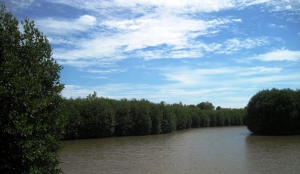The Business of Mangroves
MFF's new private sector engagement strategy promotes sustainable aquaculture while also protecting mangroves
Location: Ca Mau, Viet Nam. 1st Dec 2014
The strategic aim is to improve the overall sustainability of business practices in the coastal zone, and to make a business case for coastal ecosystem conservation and community resilience by promoting good practices while discouraging those destructive to coastal ecosystems. Moving forward, MFF will further develop this thinking and position itself as a strategic partner for companies seeking meaningful investment opportunities in coastal conservation and livelihoods, with the message that “green growth” is good for businesses operating in the coastal zone.
“The private sector will be a key player in making MFF sustainable in the long term. They must be engaged as productive partners in finding solutions to the challenges being faced by people in coastal communities,” said Steen Christensen, MFF Coordinator.
In a mangrove-related project in Ca Mau Province of Viet Nam, a partnership with Minh Phu—one of the world’s largest seafood exporters—is already producing results. Minh Phu is an active participant in the MFF National Coordinating Body for Viet Nam. Under this project, funded by BMUB/IKI and implemented by IUCN in partnership with SNV, Minh Phu has offered to pay a 10% price premium to farmers who sell them certified organic shrimp, which means maintaining more than 50% mangrove cover on their farms. This mangrove-shrimp polyculture system requires no artificial inputs or chemicals, so the shrimp can qualify as organic. More than 700 farmers are already enrolled, taking advantage of higher prices and lower risk while also making a contribution to the integrity of the local environment.
To see a short video on the project, click here: Mangroves and Markets short film

Integrated mangrove-shrimp farming plays a key role in susta ... , Ca Mau, Viet Nam © IUCN, 2013